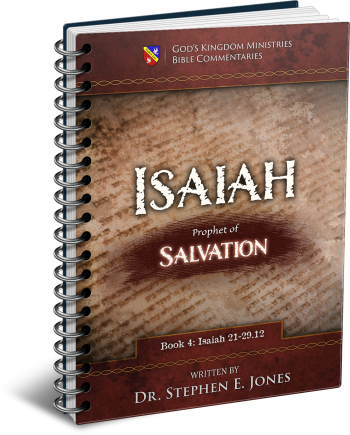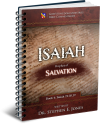Latest Posts
View the latest posts in an easy-to-read list format, with filtering options.

Isaiah is the prophet of Salvation. He is also known as the truly "Universalist" prophet, by which is meant that He makes it clear that salvation is extended equally to all nations and not just to Israel. He lived to see the fall of Israel and the deportation of the Israelites to Assyria, and he prophesied of their "return" to God (through repentance). He is truly a "major prophet" whose prophecies greatly influenced the Apostle Paul in the New Testament.
Category - Bible Commentaries

There is a short and obscure prophecy regarding Edom in Isaiah 21:11, 12 that reads,
11 The oracle concerning Edom [Dumah]. One keeps calling to me from Seir, “Watchman, how far gone is the night? Watchman, how far gone is the night?” 12 The watchman says, “Morning comes but also night. If you would inquire, inquire; come back again.”
Isaiah himself was the watchman, since the voice “keeps calling to me from Seir.” The inquiry was from Edom, or literally, from Dumah (KJV). Dumah means “silence” and comes from the root word damah, “to be dumb or silent, to cease, cut off, perish.” Dumah appears to be a shortened version of Idumea, the Greek spelling of Edom.
Idumea is a term used often in the KJV (Isaiah 34:5, 6) that is actually derived from the Septuagint (Greek translation of the Old Testament).
One of the twelve sons of Ishmael was also named Dumah (Genesis 25:13-15), but he settled in northern Saudi Arabia, a desert region the Arabs call “Dumah the Stony.” However, since the prophet tells us that the voice was from Seir, it is clear that the prophecy was about Edom and not a portion of the Ishmaelites.
Edom, “Red,” was the nickname for Esau (Gen. 25:30; 36:8), reminding him that he had despised his birthright and traded it for a bowl of red beet stew. Esau had settled in the hill country of Mount Seir, later conquering them and taking their land as Edom’s inheritance. Because Seir means “goat,” the Edomites came to represent the “goat” nations in Matt. 25:32. The sheep nations, then, are represented by Jacob-Israel in Jesus’ metaphor.
The descendants of Jacob and Esau remained adversaries until a century before Christ, when the Edomites were conquered, converted to Judaism, and absorbed into Judah around 126 B.C. At that point, Edom (or Idumea as it was called at the time) ceased to exist as a separate nation. Edom’s prophetic destiny, then, was tied to Jewry.
See my book, The Struggle for the Birthright.
The prophet kept hearing a call from Edom, “How far gone is the night?” As a watchman, Isaiah’s answer was, “Morning comes but also night.” Dumah means “silence,” and the prophet seems to apply this to the “silence” of the early morning hours. Someone representing Edom had awakened in the night and wanted to know about prophetic timing—specifically, how much more “night” they would have to endure.
The “night” itself could picture death, judgment, or oppression in general. Certainly, the idea of “silence” was often associated with Sheol, the place of the dead. Psalm 94:17 says,
17 If the Lord had not been my help, my soul would soon have dwelt in the abode of silence [dumah].
Psalm 115:17 says,
17 The dead do not praise the Lord, nor do any who go down into silence [dumah].
So also, “morning” (or dawn) can refer to resurrection after the long night of death. We see this in Hosea 6:1-3,
1 Come, let us return to the Lord, for He has torn us, but He will heal us; He has wounded us, but He will bandage us. 2 He will revive us after two days; He will raise us up on the third day, that we may live before Him. 3 So let us know, let us press on to know the Lord. His going forth is as certain as the dawn, and He will come to us like the rain.
This, of course, was a prophecy of Christ’s resurrection “after two days… on the third day,” It was also a prophecy of the two thousand years since then, which applies to the resurrection of the larger body of Christ in our own time. Resurrection is pictured as the dawn after the night of death and darkness.
Edom’s inquiry in Isaiah 21:11 appears to be about the timing of resurrection. “Are we there yet? Are we there yet?” The prophet’s answer, however, is obscure: “Morning comes but also night.” In other words, resurrection is coming but there is a second death that awaits you. This, of course, is prophesied in Rev. 20:14.
The second death implies the existence of the first death. The difference is that the first death is that which was imposed upon Adam and his entire estate and family, whereas the second death pays the penalty for one’s own sin. The first death is what we call mortality. Resurrection itself does not necessarily end the state of mortality. Only believers are given life at the resurrection, while others are judged with a second death. John 5:28, 29 says,
28 Do not marvel at this; for an hour is coming, in which all who are in the tombs will hear His voice 29 and will come forth; those who did the good deeds to a resurrection of life; those who have committed the evil deeds to a resurrection of judgment.
Though the watchman’s answer to Edom was obscure, it seems clear to us that Edom’s long night was to end with “a resurrection of judgment,” which is called “the second death.” Hence, “morning comes but also night.”
Isaiah also told Edom, “If you would inquire, inquire; come back [shuwb, “turn back, repent”] again.” This is better translated, “If you want to know more, just ask, but repent first.”
Repentance is the key, not only to obtaining revelation but also to receiving a better resurrection. Edom as a whole was destined for “the lake of fire” (Rev. 20:14), a metaphor for the judgment of God who judges all men by His “fiery law” (Deut. 33:2, KJV). This is the same metaphorical “fire” that flows as a river from the great white throne in Dan. 7:9 and10. The decrees of judgment are spoken by the mouth of Christ and from the flaming sword of His tongue.
That river of divine judgment then forms a “lake of fire” (Rev. 20:13-15) picturing the time of judgment in the age following the decrees from the divine court.
We ourselves have the benefit of the New Testament writings, which add much clarity to the often-obscure prophecies of the Old Testament. So if we use the New Testament to clarify Isaiah’s obscure prophecy to Edom, a picture emerges of “goat” nations (Seir) being raised to life at the dawn of a new day. Yet because they did not repent, another night lay ahead, the night of judgment in the second death.
Hence the first death (mortality) will end for them, which was imposed upon them on account of Adam sin; but they must yet be judged for their own sin. Sin is reckoned as a debt in Scripture, and if their debt cannot be paid, they must be “sold” and put under the authority of another (Exodus 22:3).
Normally, restitution would be required, but in this setting, no man has the means to pay for his own sin. Only the blood of Jesus can pay such a penalty. Hence, all sinners in that day will be placed into biblical slavery under the authority of those who are charged with the responsibility to teach them righteousness. Isaiah 26:9 says,
9 … For when the earth experiences Your judgments, the inhabitants of the world learn righteousness.
Edom here represents all unrepentant sinners as a whole. These unrepentant sinners will be condemned to live under the authority of the believers to teach them righteousness until they are finally set free in the great Creation Jubilee. Rom. 8:19-22 speaks of this, saying,
19 For the anxious longing of the creation waits for the revealing of the sons of God. 20 For the creation was subjected to futility, not willingly, but because of Him who subjected it in hope 21 that the creation itself also will be set free from its slavery to corruption into the freedom of the glory of the children of God. 22 For we know that the whole creation groans and suffers the pains of childbirth together until now.
Edom and all men will repent at the Great White Throne, for we are assured that “every knee will bow” and “every tongue” will “swear allegiance” (Isaiah 45:23) and profess Christ as Lord (Phil. 2:11). The revelation of truth from the Great White Throne will end all darkness and opposition. Yet these will still be required to grow to spiritual maturity, even as we ourselves have been required to grow through the revelation of Passover, Pentecost, and Tabernacles.
Very little of this was revealed in the short prophecy about Edom in Isaiah 21:11, 12. Yet what little was revealed shows that Edom was to be raised from the dead and then brought again into the night of judgment. The watchman then admonishes Edom to repent. To get a more complete understanding of God’s treatment of Edom and the nations in general, we must put this in the context of the rest of Scripture—including the longer prophecies of the nations that we have already studied in Isaiah 13-21.
As we have shown earlier, God intends to save those nations, even through judgments, and Edom is no exception.